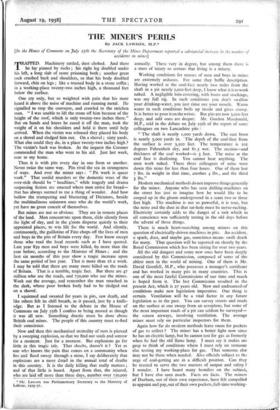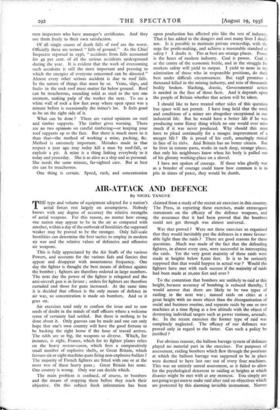THE MINER'S PERILS
. By JACK LAWSON, M.P.*
[In the House of Commons on July 25th the Secretary of the Mines Department reported a substantial increase in the number of accidents in mines] TRAPPED. Machinery rattled, dust choked. And there he lay pinned by rocks ; his right leg doubled under his left, a long slab of stone prisoning both ; another great rock crushed back and shoulders, so that 'his body doubled forward, chin on legs ; like a trussed body in a stone coffin ; in a working-place twenty-two inche6 high, a thousand feet below- the surface.
One cry only, but so weighted with pain that his mate heard it above the noise of machine and running metal. He signalled to stop the conveyor, and crawled to the stricken man. " I was unable to lift the stone off him because of the height of the roof, which is only twenty-two inches there."
But on hands and knees he eased it off the man, took the weight of it on his shoulders and held it there until help arrived. When the victim was released they placed his body on a shovel and sledged him out. On a shovel ; sixty yards. What else could they do, in a place twenty-two inches high ? The victim's back was broken. At the inquest the Coroner commended the man who went to his aid. Just last week, near to my home.
Thus it is with pits every day in one form or another. Never twice the same way. Pits rival the sea in strangeness of ways. And ever the miner says : " Pit work is- queer work." That sordid murders or the domestic woes of the over-rich should be " headlines," while tragedy and drama surpassing fiction are enacted where men strive for bread— that has always seemed to me a thing of wonder. And how hollow the trumpeting and blustering of Dictators, beside the multitudinous unknown ones who do the world's work, yet have no great conceit of themselves.
But mines are not so obvious. They are in remote places of the land. Men concentrate upon them, slide silently from the light of .day, and in the gloom disperse quietly to their appointed places, to win life for the world. And silently, continuously, the guillotine of Fate chops off the lives of men and boys in the pits of Britain every day. Few know except those who read the local records such as I have quoted. Last year 859 men and boys were killed, 69 more than the year before, according to the Minister of Mines ; and the first six months of this year show a tragic increase upon the same period of last year. That is more than 16 a week. I may be told that there are many more killed on the roads of Britain. That is a terrible, tragic fact. But there are 47 million who use the roads, and 750,000 who use the mines. Work out the average, and remember-the man smashed in the dark, whose poor broken body had to be sledged out on a shovel.
I squirmed and sweated for years in pits, saw death, and like others felt its chill breath, as it passed; just by a knife- edge. But as I listened to the debate in the House of Commons on July 25th I confess to being moved as though it was all new. Something drastic must be done about British coal mines. The people of this country must re-find their conscience.
Now and then this mechanised mentality of ours is pierced by a sweeping explosion, so that we find our souls and sorrow for a' moment. Just for a moment. But explosions go for little in this tragic tale.. That shocks, doesn't it ? Yet as one who knows the pain that comes on a community when fire and flood sweep through a mine, I say deliberately that explosions are a mere detail in the annual total of deaths in this country. It is the daily killing that really matters ; and of that little is heard. Apart from that, the injured, who are laid off more than three days, number over 150,000
* Mr. Lawson was Parliamentary Secretary to the Ministry of Labour, 1929-31.
annually. These vary in degree, but among them there is a mass of injury so serious that living is a misery.
Working conditions for masses of men and boys in mines are extremely arduous. For some they baffle description. Having worked at the coal-face nearly two miles from the shaft in a pit nearly 2,000 feet deep, I know what it is to work naked. A negligible loin-covering, with boots and stockings, was my full rig. In such conditions you don't swallow your drinking-water, you just rinse out your mouth. Warm water in such conditions boils up inside and gives cramp. It is better to pour it on the wrists. But pits are now 3,000 feet deep, and odd ones are deeper. Mr. Gordon Macdonald, M.P., told in the debate on July 25th of the report of some colleagues on two Lancashire pits : " The shaft is nearly 1,000 yards down. The east brow is nearly 3,000 yards in. The depth of the coal-face from the surface is over 3,50o feet. The temperature is 102 degrees Fahrenheit dry, and 8r.5 wet. The section—and thickness of the coal worked—is 3 feet. The noise at the coal face is deafening. You cannot hear anything. The men work naked. These three colleagues of mine were down this mine for less than four hours. One of them lost 7 lbs. in weight in that time, another 4 lbs., and the third 3 lbs."
Modern mechanical methods do not improve things generally for the miner. Anyone who has seen drilling-machines on the street has just to imagine how he would like to be cooped up in the gloom underground in a seam two or three feet high. The machine is not so powerful, it is true, but the noise and the dust in that rat-hole must be nerve-racking. Electricity certainly adds to the danger of a task which in all conscience was sufficiently testing in the old days before the advent of these things.
There -is much heart-searching among miners on this question of electrically-driven machines in pits. An accident, a spark, dust, and maybe gas, sometimes mean; swift death for many. That question will be reported on shortly by the Royal Commission which has been sitting for over two years.
All the old dangers and some new ones have been deeply considered by this Commission, composed of some of the ablest men in the world of mining. One of them is Mr, David Grenfell, M.P., who possesses a manager's certificate and has worked in many pits in many countries. This is one of the most fateful Commissions of our time and much is hoped from it. The last Commission resulted in the present Act, which is 27 years old. New and undreamed-of conditions make new legislation imperative. One thing is certain. Ventilation will -be a vital factor in any future legislation as in the past. You can survey streets and roads on the surface at one sweep from an aeroplane, but some of the most important roads of a pit can seldom be surveyed— the return airways, involving ventilation. The average miner must rely on particular inspectors for them.
Again how far do modern methods leave room for pockets of gas to collect ? The miner has a better light now since he has an electric lamp, but he cannot test for gas as formerly when he had the old flame lamp. I must say it makes me gasp to think of conditions where I must rely on someone else testing my working-place for gas. That someone else may not be there when needed. Also officials subject to the urge of coal-getting are in a difficult position. Can they be trusted to serve the two masters of output and safety ? I wonder. I have heard many homilies on the subject, but I have also seen much. Facts are facts. The miners of Durham, out of their own experience, have felt compelled to appoint and pay, out of their own pockets, full-time working- men inspectors who have manager's certificates. And they use them freely to their own satisfaction.
Of all single causes of death falls of roof are the worst. Officially these are termed " falls of ground." As the Chief Inspector reported in 1936, " accidents from falls accounted for 49 per cent. of all the serious accidents underground during the year. It is evident that the work of overcoming such accidents is still the most important and pressing to which the energies of everyone concerned can be directed." Almost every other serious accident is due to roof falls. In the nature of things that must be so. Veins, slips, and faults in the rock roof must matter far below ground. Roof can be treacherous, sounding solid as steel to the test one moment, making pulp of the worker the next. To see a white wall of rock a few feet away where open space was a minute before is occasionally the miner's lot. It feels good to be on the right side of it.
What can be done ? There are varied opinions on steel and timber supports. The timber gives warning. There are no two opinions on careful timbering—or keeping your roof supports up to the face. But there is much more to it than that—the method of working a mine, packing, &c. Method is extremely important. Mistakes made in that respect a year ago may today kill a man by roof-fall, or explode a pit. A mine is a thing linking everybody to it today and yesterday. She is as alive as a ship and as personal. She needs the same minute, far-sighted care. But at best she can be treacherous.
One thing is certain. Speed, rush, and concentration upon production has affected pits like the rest of industry. That it has added to the dangers and cost many lives I doubt not. Is it possible to maintain private ownership, with the urge for profit-making, and achieve a reasonable standard of safety ? I doubt it. Pits at best are strange places. Power is the heart of modern industry. Coal is power. Coal is at the centre of the economic battle, and in the struggle for markets safety will yield to output. I yield to none in my admiration of those who in responsible positions, do their best under difficult circumstances. But 1938 promises a thousand killed in the mining industry, and tens of thousands bodily broken. Slashing, drastic, Governmental action is needed in the face of those facts. And it depends upon the people of Britain whether that action will be taken.
I should like to have treated other sides of this question but space will not permit. I have long held that the work and conditions of a miner are altogether exceptional in our industrial life. But he would have a better life if he was producing some flimsy thing which no one would ever miss much if it was never produced. Why should this man have to plead continually for a meagre improvement of a meagre life ? He is proud of his craft, amazingly stoical in face of its risks. And Britain has no better citizen. But he lives in remote parts, works in such deep, strange places, that only his neighbours know when his body is pulled out of his gloomy working-place on a shovel.
I have not spoken of courage. If those who glorify war as a breeder of courage could know how common it is in pits in times of peace, they would be dumb.







































 Previous page
Previous page